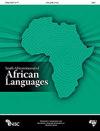(Re)考虑Haugen在乌干达标准斯瓦希里语教学中的模式
IF 0.4
0 LANGUAGE & LINGUISTICS
引用次数: 0
摘要
在乌干达,斯瓦希里语是一门外语,被规定为该国的第二官方语言,主要是因为它在该地区日益重要。虽然这种官方地位大大增加了全国小学后阶段的教学,但在学校中考虑哪种斯瓦希里语变体的问题基本上仍未决定。因此,鉴于现有的教育语言政策对这一问题保持沉默,各种斯瓦希里语变体的广泛使用在乌干达的学习机构中不断地逐渐蓬勃发展。这种做法与卡普兰和小巴尔道夫对学校的看法形成了对比,学校是教授特定语言的选定或标准变体的正式场所。本文采用Bowen的文献分析技术,主要回顾了斯瓦希里语教学的假设,主要概述了乌干达现有的语言教育政策。这篇综述为探索Haugen修订的语言规划模型提供了理由,该模型旨在为(重新)强调乌干达教育系统中标准斯瓦希里语的教学建立可能性。本文章由计算机程序翻译,如有差异,请以英文原文为准。
(Re)considering Haugen’s model in the teaching and learning of standard Kiswahili in Uganda
In Uganda, Kiswahili is a foreign language and is provided for as the second official language of the country mainly due to its growing importance in the region. While such an official status has significantly increased its teaching in post-primary phases across the country, the question on which Kiswahili variety or varieties to be considered in schools has remained predominantly undecided. As a result, given that the existing language-in-education policy is silent on this matter, the widespread use of various Kiswahili varieties has unceasingly and gradually flourished in the learning institutions of Uganda. This practice contrasts with Kaplan’s and Baldauf Jr.’s perspectives on schools, as formal sites for the teaching of a selected or standard variety of a given language. Employing Bowen’s document analysis techniques, this article primarily reviews postulations on the teaching of Kiswahili, as primarily outlined in the Uganda’s existing language-in-education policy. The review offers justifications to explore Haugen’s revised language planning model to purposely establish possibilities for (re-)emphasising the teaching and learning of standard Kiswahili in the Uganda’s education systems.
求助全文
通过发布文献求助,成功后即可免费获取论文全文。
去求助
来源期刊

South African Journal of African Languages
LANGUAGE & LINGUISTICS-
CiteScore
0.50
自引率
0.00%
发文量
30
期刊介绍:
The South African Journal of African Languages is a peer-reviewed research journal devoted to the advancement of African (Bantu) and Khoi-San languages and literatures. Papers, book reviews and polemic contributions of a scientific nature in any of the core areas of linguistics, both theoretical (e.g. syntax, phonology, semantics) and applied (e.g. sociolinguistic topics, language teaching, language policy), and literature, based on original research in the context of the African languages, are welcome. The journal is the official mouthpiece of the African Language Association of Southern Africa (ALASA), established in 1979.
 求助内容:
求助内容: 应助结果提醒方式:
应助结果提醒方式:


